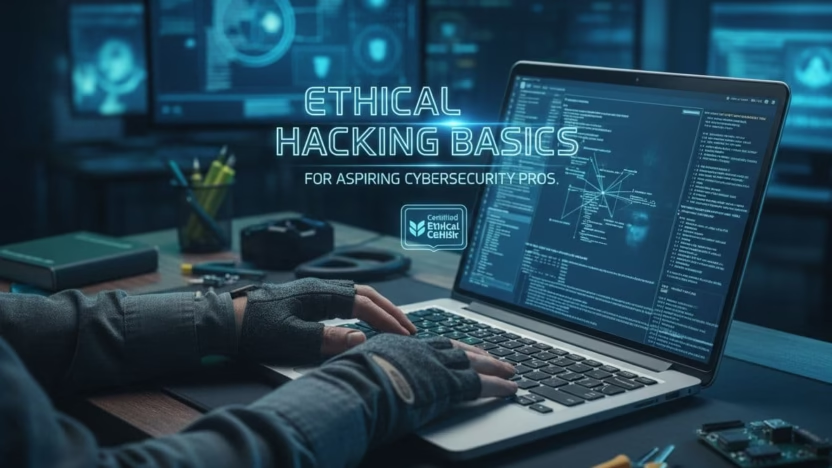Imagine this: in 2020, ethical hackers at Paytm spotted a major flaw in their digital wallet system before criminals could steal user data. That quick find stopped a potential disaster and kept millions safe. Stories like this show how ethical hacking turns the tables on cyber threats.
Ethical hacking means testing computer systems and networks with permission to uncover weak spots. You act like a good guy hacker to fix issues before real bad actors strike. It’s all legal and focused on protection.
If you’re eyeing a career in cybersecurity, this field fits perfectly. Cyber attacks keep climbing, and by 2025, companies will need more pros to fight back. Jobs pay well, often over £50,000 a year, and you make a real difference by guarding people’s privacy.
In this post, we’ll cover the basics step by step: from key tools like Nmap to simple scanning techniques. You’ll learn how to start reconnaissance safely and why ethics matter most. Stick around to build skills that open doors to exciting roles and help stop breaches before they happen.
Table of Contents
- What Is Ethical Hacking and Why Does It Matter for Cybersecurity?
- Essential Skills Every Aspiring Ethical Hacker Should Master
- Step-by-Step Guide to Starting Your Ethical Hacking Journey
- Conclusion
What Is Ethical Hacking and Why Does It Matter for Cybersecurity?
Ethical hacking involves authorised testing of computer systems to spot vulnerabilities before malicious hackers can exploit them. You gain permission from owners to probe networks and software, much like a trusted mechanic checks your car for faults. This practice stands in sharp contrast to illegal hacking, where intruders break in without consent to steal data or cause damage. By following strict rules, ethical hackers stay on the right side of the law and focus on defence.
Think about the CIA triad, which guides much of this work: confidentiality keeps data private, integrity ensures it stays unchanged, and availability means systems run without interruption. In today’s world, where cyber threats surge, ethical hacking protects organisations from massive financial hits and privacy breaches. For instance, global cybercrime costs could top $10.5 trillion by 2025, with attacks hitting firms weekly at rates over 1,900 times. These stats underline why ethical hackers matter; they cut risks and build secure digital spaces. Plus, careers here offer stability, with high demand for pros who safeguard privacy and stop losses.
The Difference Between Ethical and Malicious Hacking
Ethical hackers operate with full permission from system owners. They follow clear rules and document every step to help fix issues. Picture a security guard who tests door locks at night to spot weak ones; he reports back so the owner can reinforce them. Malicious hackers, on the other hand, sneak in without invite. They pick those locks to rob the place or cause chaos, often for money or revenge. Both might use similar tools, like scanning software or exploit kits, but the intent sets them apart.
Ethical hacking builds trust with clients and opens doors to solid careers in cybersecurity. You avoid legal troubles, such as jail time, that plague black-hat hackers. Companies hire these white-hat pros to stay ahead of threats. In short, one side strengthens defences; the other tears them down. For a deeper look at how ethical hackers simulate attacks, check out this guide from EC-Council.
How Ethical Hacking Strengthens Overall Cybersecurity
Ethical hackers mimic real attacks to reveal hidden flaws in networks, software, and apps. They run vulnerability scans to detect outdated patches and perform penetration tests, where they try to breach systems just like criminals would. These tasks expose weak points, from poor passwords to unsecure code, before harm strikes.
The payoff shows in lower breach risks and smoother compliance with rules like GDPR. Teams cut potential losses; ransomware recovery alone averages $2.73 million per hit. Ethical hackers collaborate with other cybersecurity experts, sharing findings to patch holes fast. In 2025, with threats like AI-driven phishing on the rise and attacks doubling since 2021, this work proves essential. Jobs in the field grow quickly, driven by a shortage of four million skilled workers. Overall, it fortifies defences and supports a safer online world. Learn more about the benefits in this American Public University article.
Essential Skills Every Aspiring Ethical Hacker Should Master
You don’t need a fancy degree to break into ethical hacking. Hands-on practice counts more than paper qualifications. Start small with free online tutorials, and build skills that let you spot and fix security gaps. These basics prepare you for real-world tasks, like scanning networks or scripting tests. By 2025, with cyber threats evolving fast, mastering them opens doors to rewarding cybersecurity jobs. Let’s look at the key areas to focus on first.
Building a Foundation in IT and Networking
Grasp the basics of computers and how they connect. Learn operating systems like Windows for everyday use and Linux for its power in security tools. Networks form the backbone; understand protocols such as TCP/IP to see how data travels from one device to another.
Knowing data flow helps you pinpoint weaknesses, like open ports that invite trouble. In ethical hacking, this knowledge lets you test firewalls effectively, simulating attacks to check defences.
Start simple: set up a home network with a router and a few devices. Use free resources to experiment safely. For a solid intro, check out Network Basics for Ethical Hackers on Medium. Practice builds confidence, and soon you’ll trace issues like a pro.
Learning Programming for Hacking Tools
Pick Python; it’s straightforward and perfect for beginners in ethical hacking. Focus on core ideas like loops to repeat tasks and functions to organise code. You won’t need complex programmes yet; simple scripts automate scans or check passwords.
This skill helps you understand exploits by reading and tweaking others’ code. It ties straight to cybersecurity, where you write tools to probe systems without harm.
Practice with short projects, like a basic file scanner. Sites like Codecademy offer free Python lessons tailored to security. Try Python 101 for Hackers for guided examples. Keep sessions short to avoid burnout, and apply what you learn to mock tests. Over time, you’ll create custom tools that boost your efficiency.
Grasping Common Cyber Threats and Defences
Cyber threats come in many forms. Phishing tricks users into sharing details via fake emails. Malware sneaks in to steal or damage data. DDoS attacks flood servers, knocking sites offline.
Defences fight back: encryption scrambles data to keep it safe, while antivirus software hunts and blocks malware. Firewalls act as gatekeepers, stopping unwanted traffic.
In ethical hacking, you mimic these threats to strengthen systems. Test phishing simulations to train staff, or probe for DDoS weak spots. Early 2025 saw a phishing wave hit UK retailers, exposing customer info; hackers who knew these tactics helped patch it fast. Build this knowledge step by step through scenarios. Resources like OWASP guides show real examples. Spot threats early, and you’ll prevent real damage.
Step-by-Step Guide to Starting Your Ethical Hacking Journey
Ready to dive into ethical hacking? Start with self-study using free resources like Coursera courses on cybersecurity basics or EC-Council’s online modules for 2025. These build your knowledge without cost. Next, set up a safe practice space to test skills legally. Move on to certifications that validate your expertise, then seek real-world experience through projects and networks. Always stick to your own systems or approved labs; hacking without permission lands you in trouble. Persistence pays off in this field, leading to stable jobs that protect against rising threats. Follow these steps, and you’ll gain the skills to become a cybersecurity pro.
Set Up Your Learning Environment and Practice Safely
Kick off your journey by installing Kali Linux, the top choice for ethical hackers. Download it from the official site and run it in a virtual machine using free tools like VirtualBox. This setup creates a safe lab where you can experiment without risking real systems. For a quick guide, see this installation tutorial.
Remember, ethics come first: never test on networks or devices without clear permission. Focus on hands-on practice in isolated environments to scan for vulnerabilities or run basic exploits. To add real stakes safely, join bug bounty programmes. Platforms like HackerOne and Bugcrowd let beginners hunt flaws in live sites for rewards. Check out this beginner’s overview to get started. This approach builds skills without legal risks, keeping your learning focused and fun.
Pursue Key Certifications to Boost Your Credentials
Certifications give your resume a strong edge in the 2025 job market, where employers seek proven skills amid talent shortages. Begin with CompTIA Security+, which covers network security, threats, and compliance basics. It costs around £300 and takes 2-3 months of study; use free practice exams on their site to prepare.
Next, aim for Certified Ethical Hacker (CEH) from EC-Council. This dives into penetration testing, scanning, and social engineering, showing you how to think like an attacker. Expect £1,000 including the exam, but pair it with online videos for efficient prep. These creds open doors to junior roles, proving you can handle real defences. In a field growing 32% by 2031, they speed up your path to steady pay and impact.
Gain Experience Through Internships and Real Projects
Hands-on work turns theory into expertise, so join cybersecurity communities like Reddit’s r/netsec or local meetups to connect with pros. Look for internships at firms offering entry-level security tasks; sites like Indeed list beginner spots that teach on the job.
Build a portfolio from your lab projects, such as vulnerability reports or scripted scans, and share them on GitHub. Network on LinkedIn by following experts and commenting on posts; it often leads to mentorship or openings. Start small with volunteer audits for non-profits. The outlook shines bright: with cyber jobs booming, your efforts lead to roles that safeguard data and earn respect. Keep pushing, and you’ll thrive in this vital field.
Conclusion
Ethical hacking basics give you the power to spot and fix cyber threats before they cause harm. You learn to test systems legally, master tools like Nmap and Python scripts, and understand threats from phishing to DDoS attacks. These skills build a solid path in cybersecurity, where you protect data and help organisations stay safe.
The field looks bright for 2025 in the UK. Demand for pros stays high, with a shortage of skilled workers driving job growth. Expect salaries from £50,000 to over £64,000, plus the satisfaction of real impact. Certifications like CEH boost your chances and open doors to flexible roles.
Start today: pick one course on Coursera or set up a Kali Linux lab at home. Take that first step to turn your interest into a rewarding career.
You can help shield the digital world from rising risks. Keep learning, stay ethical, and join the fight to make online spaces secure for everyone.




